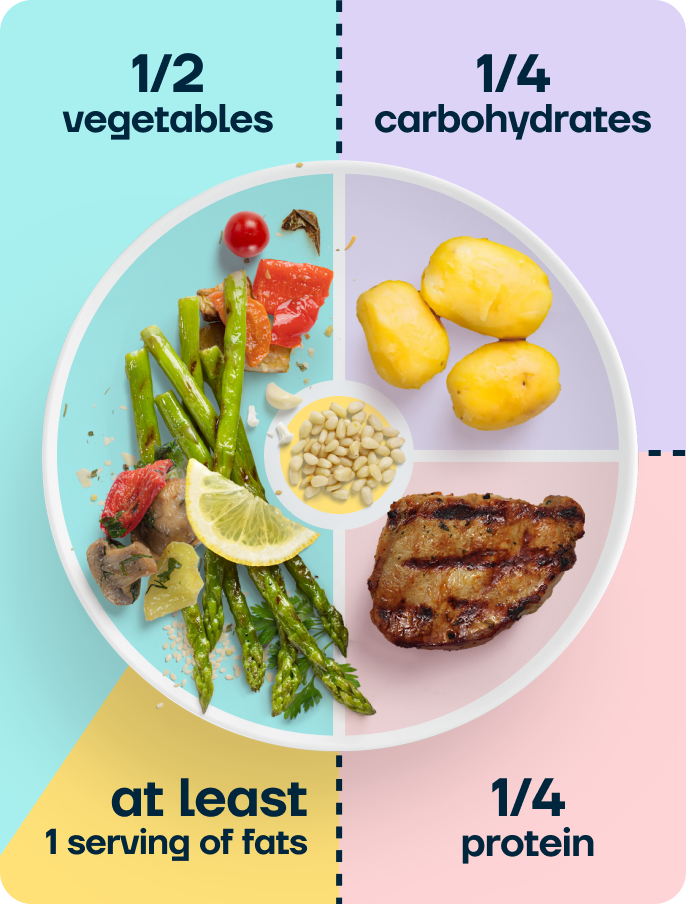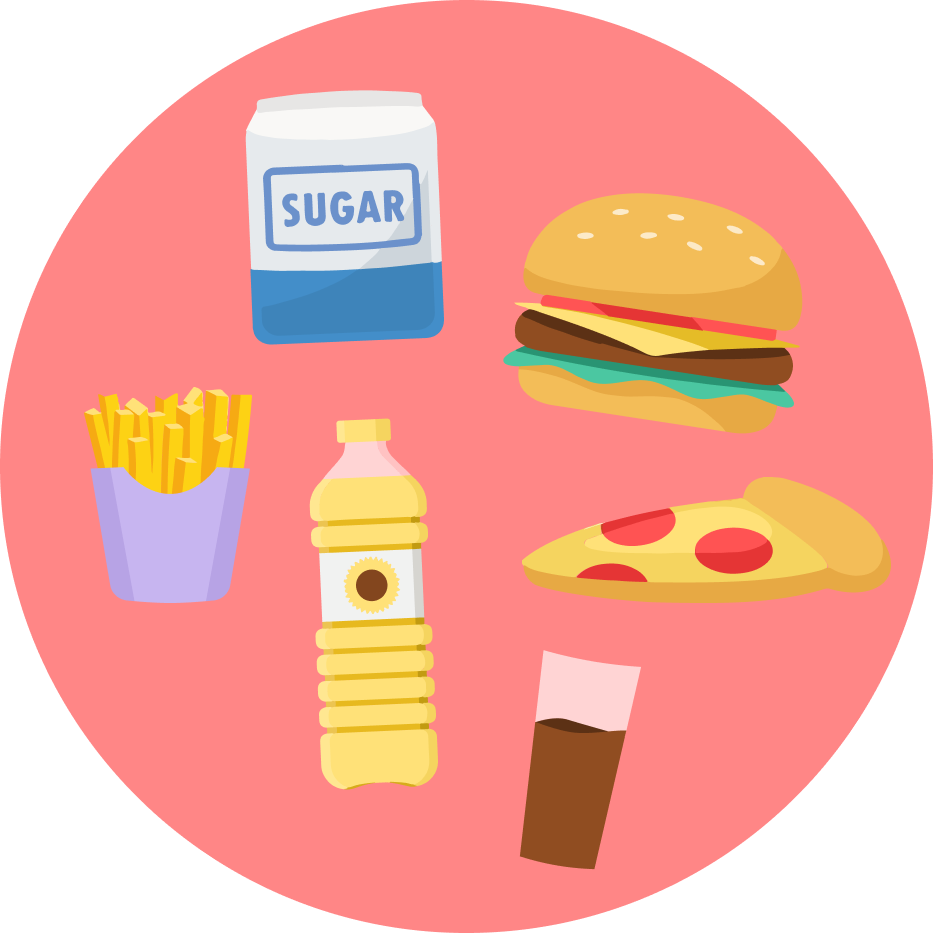Jump to: What foods work best with Mounjaro? | Foods to minimize while on Mounjaro | Meal timing and structure on Mounjaro | Practical meal examples | Managing side effects through diet | Frequently asked questions
A balanced diet rich in protein, fibre, complex carbohydrates, and whole foods is the best approach while taking Mounjaro (tirzepatide).

While no specific diet has been clinically proven superior for Mounjaro users in research, human clinical evidence shows that diets based on whole foods are the best approach to support weight loss and all-round health.
The medication works by slowing digestion and reducing appetite, making food quality particularly important for sustaining energy, providing enough high-quality protein, and preventing nutrient deficiencies.
What foods work best with Mounjaro?
Protein-rich foods should form the foundation of your diet while taking Mounjaro.
Studies show consuming 1.2-1.6g of protein per kilogram of body weight (around 30-40g of protein in each meal) helps preserve muscle mass during weight loss, which is particularly important on Mounjaro as the hunger-lowering effects can lead to insufficient protein and energy intake to maintain muscle and other lean tissues like bone.
On Mounjaro, we should aim for around 25% of our plate to come from protein at each meal, which helps maintain muscle mass and lowers hunger more than carbohydrate and fat. For someone weighing 80kg, this would be roughly 90-120g of protein per day.
Plus, nutrient density becomes particularly important as we need to ensure we’re getting sufficient micronutrients and minerals, such as vitamin C, B12, and iron, to meet our body’s daily needs and avoid deficiencies.
Foods like red meat, liver, fish, seafood dairy, berries, and green leafy vegetables are particularly nutrient-dense and will help us avoid nutrient deficiencies while on Mounjaro.

Foods to prioritise on Mounjaro:
- High-quality protein sources: Fish (particularly oily varieties like salmon providing 22g protein per 100g), red and lean meats, eggs (6g protein per egg), Greek yogurt (10g protein per 100g), cottage cheese, tofu (8g protein per 100g), tempeh, and seafood.
- Nutrient-dense vegetables: Dark leafy greens like kale and spinach, broccoli, Brussels sprouts, peppers, and other non-starchy vegetables provide essential vitamins and minerals.
- Fat from whole foods: Avocados (9g fat per 50g serving), nuts (particularly almonds and walnuts), seeds (such as chia and flaxseeds with 4g fibre per tablespoon), olive oil, and oily fish help slow digestion and improve nutrient absorption.
- Complex carbohydrates high in fibre: Whole grains like quinoa (5g protein and 2.8g fiber per 100g), brown rice, oats, sweet potatoes, legumes like lentils (7.8g fibre per 100g) and chickpeas provide sustained energy and digestive health benefits.
- Low-sugar fruits: Berries (particularly raspberries with 6.5g fibre per 100g), apples, and pears offer sweetness with fibre and antioxidants.
Foods to minimise while on Mounjaro
Ultra-processed foods can worsen digestive side effects and provide poor nutritional value, especially when your appetite is reduced.

- Ultra-processed foods: Most boxed cereals, supermarket bread and pastries, fast food, microwave meals, oven pizza, crisps, biscuits, fizzy drinks, and supermarket sandwiches often contain additives that can worsen gastrointestinal symptoms.
- Added sugars: Foods with high sugar content can cause rapid blood sugar fluctuations that can impact our hunger and energy levels.
- Refined carbohydrates: White pasta, white rice, and other low-fibre starches digest quickly and don’t provide the same hunger-lowering effect as high-fibre carbohydrates like brown rice and quinoa.
- Alcohol: Drinking alcohol while on Mounjaro can intensify side effects and reduce your liver’s ability to process the medication effectively.
You can read our guide on a balanced diet for an in-depth analysis of what to eat to support weight loss and good health.
Meal timing on Mounjaro
The medication’s effect on slowing gastric emptying (slower digestion) makes meal timing particularly important. Plus, if we come off of the medication in the future, having a regular meal pattern is a crucial habit to support weight loss maintenance in the long term.
Regular meal patterns: Eating at consistent times helps manage blood sugar and hunger levels. So, having breakfast, lunch, and dinner around the same time each day.
Adequate portions: While Mounjaro reduces appetite, extremely small portions won’t provide sufficient nutrients and protein. Aim for balanced plates with big enough portions of protein, vegetables, and complex carbohydrates.
The importance of breakfast: Morning protein intake is particularly important on Mounjaro. Aim to eat at least 30-40g of protein with your breakfast.
Hydration between meals: Drinking water throughout the day helps manage constipation, a common side effect.
Practical meal examples for Mounjaro patients
Breakfast options:
- Greek yoghurt (250g = ~20g protein) with berries, and a tablespoon of nuts and seeds
- 4 eggs (~25g protein) with wilted spinach and a slice of wholegrain toast
- Protein smoothie with whey or plant protein powder (25g protein), a handful of wilted spinach, berries, and a tablespoon of nut butter
- Overnight oats made with milk or yoghurt, chia seeds, and chopped apple
Lunch ideas:
- Tuna salad (85g tuna = 20g protein) with mixed greens, cherry tomatoes, cucumber, and olive oil dressing
- Chicken breast (85g = 26g protein) with roasted vegetables and quinoa
- Lentil soup (200g serving = 14g protein) with a small wholegrain roll (add boiled eggs for added protein)
Dinner suggestions:
- Baked salmon (115g = 25g protein) with steamed broccoli and sweet potato
- Turkey meatballs (85g = 22g protein) with courgette noodles and tomato sauce
- Tofu stir-fry (250g tofu = ~25g protein) with mixed vegetables and brown rice
- Bean and vegetable chilli with a small portion of brown rice
Managing side effects through diet
Dietary strategies can help manage common Mounjaro side effects.
For nausea:
- Eat smaller, more frequent meals if three standard meals cause discomfort
- Ginger tea or ginger supplements (250mg) have shown efficacy in UK clinical settings
- Avoid strong aromas and very spicy foods
- Cold foods may cause less nausea than hot meals
For constipation:
- Increase fibre intake gradually from whole food sources
- Include more high-fibre foods like berries, ground flaxseeds or chia seeds (2 tablespoons = 3.8g fiber), and legumes
- Maintain adequate hydration (minimum 1.5-2 litres daily)
- Consider a magnesium supplement (300-400mg daily)
For fatigue:
- Ensure adequate protein intake throughout the day
- Include iron-rich foods like lean red meat, spinach, and lentils
- Consider vitamin B12 sources (particularly important for those reducing meat intake)
- Maintain 3 balanced meals a day to stabilise energy levels
Frequently asked questions
Do I need to count calories while on Mounjaro?
Calorie counting isn’t necessary while on Mounjaro, or when you’re losing weight.
Calorie counting can lead to an unhelpful obsession with numbers and perfection-seeking with our meals.
It’s better to focus on more sustainable ways of managing our intake, like using our balanced plate model and measuring portions with your hands.
Should I follow a low-carb or ketogenic diet with Mounjaro?
There’s no definitive evidence that low-carb or ketogenic diets enhance Mounjaro’s effectiveness. While some patients report success with these approaches, more restrictive diets are less sustainable in the long term.
We recommend a more balanced approach that includes high-quality carbohydrates from vegetables, fruits, and whole grains while prioritising protein. This provides more nutritional variety and sustainability than very restrictive diets.
How much protein do I need while taking Mounjaro?
Research suggests aiming for 1.2-1.6g of protein per kilogram of body weight daily while on Mounjaro. For someone weighing 75kg, this means approximately 90-120g of protein daily.
Practically, this translates to including a substantial protein source (approximately 25-40g) at each meal, with smaller amounts in snacks if needed.
We recommend spreading protein intake throughout the day rather than consuming it all at one meal.
Will my food preferences change on Mounjaro?
Many patients report changes in food preferences while taking Mounjaro. Research also shows a reduced desire to energy-dense, highly rewards foods while taking GLP-1 medications.
How do I ensure I’m getting enough nutrients with a smaller appetite?
Focus on nutrient density rather than volume. Choose foods that provide multiple nutrients per calorie, such as:
- Eggs (complete protein plus vitamins D, B12, and choline)
- Oily fish (protein, omega-3 fatty acids, vitamin D)
- Dark leafy greens (vitamins A, C, K, folate, iron)
- Nuts and seeds (healthy fats, protein, vitamins, minerals)
- Red meat (protein, B12, and iron)
Take home message
While there’s no single ‘perfect’ diet for Mounjaro patients, focusing on whole, nutrient-dense foods optimises both weight loss results and overall health.
Prioritising protein and fibre helps preserve muscle mass and manage side effects, while minimising ultra-processed foods supports the medication’s effectiveness.
Plus, if we intend to come off of the medication in the future, it’s essential to use the time on the medication to develop healthy eating habits so that we can maintain weight loss in the long term.
Second Nature's Mounjaro programme
Second Nature provides Mounjaro as part of our Mounjaro weight-loss programme
Why choose Second Nature over other medication providers, assuming you’re eligible?
Because peace of mind matters.
We’ve had the privilege of working with the NHS for over eight years, helping people across the UK take meaningful steps toward a healthier, happier life.
Our programmes are designed to meet people where they are, whether that means support with weight loss through compassionate one-to-one health coaching, or access to the latest weight-loss medications (like Mounjaro) delivered alongside expert care from a multidisciplinary team of doctors, psychologists, dietitians, and personal trainers.
At the heart of everything we do is a simple belief: real, lasting change comes from building better habits, not relying on quick fixes. We’re here to support that change every step of the way.
With over a decade of experience, thousands of lives changed, and a long-standing record of delivering programmes used by the NHS, we believe we're the UK’s most trusted weight-loss programme.
We hope to offer you something invaluable: peace of mind, and the support you need to take that first step.






